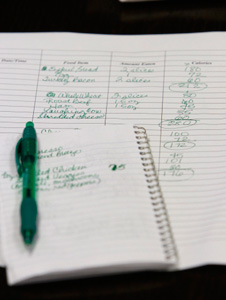 If you’ve been dieting for any length of time, you’ve undoubtedly heard the words “calorie deficit.” It’s a big term that has a very simple meaning. At its most basic, a calorie deficit is an equation for successful weight loss. Just as 1+2=3 is true, calories burned – calories ingested = weight loss.
If you’ve been dieting for any length of time, you’ve undoubtedly heard the words “calorie deficit.” It’s a big term that has a very simple meaning. At its most basic, a calorie deficit is an equation for successful weight loss. Just as 1+2=3 is true, calories burned – calories ingested = weight loss.
A calorie, by definition, is the amount of heat required to raise the temperature of a kilogram of water by one degree Celsius. In its more common use, it is used to determine how much the foods that you eat will affect your weight. A calorie deficit is created when the amount of food energy (calories) you take in is less than the total calories you use, and it is the difference between what you eat and what your body burns. In order to lose weight, you will need to create a calorie deficit. This means that your body will turn to stored energy to function and you will see a weight loss. The size of the calorie deficit will determine how much weight you will lose.
The general rule of thumb for weight loss is that you have to burn 3500 calories in order to lose a pound of weight. This is because there are approximately 3500 calories in one pound of fat. It’s impossible to burn off that amount in one day, so for success you will need to spread it over the course of a week. If your goal is to lose a pound a week, divide the 3500 calories by the 7 days in a week. You will need to eat 500 calories less each day to have a 3500 calorie deficit. To lose two pounds a week, double those figures. In order to speed up your weight loss or to increase your calorie deficit, you can also increase your physical efforts and burn more calories. For best results, combine the two.
It’s fairly easy to remove 250 calories from your daily diet – stop drinking soda, trade skim milk for your whole, cut out your afternoon coffee and muffin habit. Then, add in some extra exercise. A brisk hour of walking will burn about 250 calories, as will half an hour of rowing, running or swimming laps.
Also Read:
